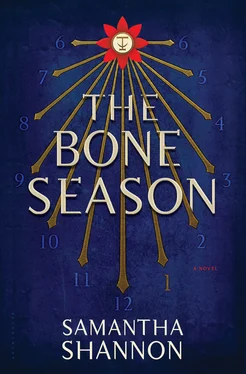I took out my standard-issue data pad and selected my favorite legal novel. Without a spool to protect me, the only real security I had was to look as normal and amaurotic as possible.
As I flicked through the pages, I kept one eye on the man. I could tell I was on his radar, but neither of us spoke. As he hadn’t already grabbed me by the neck and beaten me senseless, I guessed he probably wasn’t a freshly duped art enthusiast.
I risked a glance at his copy of the Descendant , the only broadsheet still mass-produced on paper. Paper was too easy to misuse; data pads meant we could download only what little media had been approved by the censor. The typical news glowered back at me. Two young men hanged for high treason, a suspicious emporium closed down in Section 3. There was a long article rejecting the “unnatural” notion that Britain was politically isolated. The journalist called Scion “an empire in embryo.” They’d been saying that for as long as I could remember. If Scion was still an embryo, I sure as hell didn’t want to be there when it burst out of the womb.
Almost two centuries had passed since Scion arrived. It was established in response to a perceived threat to the empire. The epidemic , they called it—an epidemic of clairvoyance. The official date was 1901, when they pinned five terrible murders on Edward VII. They claimed the Bloody King had opened a door that could never be shut, that he’d brought the plague of clairvoyance upon the world, and that his followers were everywhere, breeding and killing, drawing their power from a source of great evil.
What followed was Scion, a republic built to destroy the sickness. Over the next fifty years it had become a voyant-hunting machine, with every major policy based around unnaturals. Murders were always committed by unnaturals. Random violence, theft, rape, arson—they all happened because of unnaturals. Over the years, the voyant syndicate had developed in the citadel, formed an organized underworld, and offered a haven for clairvoyants. Since then Scion had worked even harder to root us out.
Once they installed RDT, the syndicate would fall apart and Scion would become all-seeing. We had two years to do something about it, but with Hector as Underlord, I couldn’t see that we would. His reign had brought nothing but corruption.
The train went past three stops without incident. I’d just finished the chapter when the lights went out and the train came to a halt. I realized what was happening a split second before the other passenger did. He sat up very straight in his seat.
“They’re going to search the train.”
I tried to speak, to confirm his fear, but my tongue felt like a piece of folded cloth.
I switched off my data pad. A door opened in the wall of the tunnel. The Nixie display in the carriage clicked to SECURITY ALERT. I knew what was coming: two Underguards on their rounds. There was always a boss, usually a medium. I’d never experienced a spot check before, but I knew few voyants got away from them.
My heart dashed against my chest. I looked at the other passenger, trying to measure his reaction. He was a medium, though not a particularly powerful one. I could never quite put a finger on how I could tell, my antennae just perked up in a certain way.
“We have to get out of this train.” He rose to his feet. “What are you, love? An oracle?”
I didn’t speak.
“I know you’re voyant.” He pulled at the handle of the door. “Come on, love, don’t just sit there. There must be a way out of here.” He wiped his brow with his sleeve. “Of all the days for a spot check—the one day —”
I didn’t move. There was no way to get out of this. The windows were toughened, the doors safety-locked—and we were out of time. Two torch beams shone into the carriage.
I held very still. Underguards. They must have detected a certain number of voyants in the carriage, or they wouldn’t have killed the lights. I knew they could see our auras, but they’d want to find out exactly what kind of voyants we were.
They were in the carriage. A summoner and a medium. The train carried on moving, but the lights didn’t come on. They went to the man first.
“Name?”
He straightened. “Linwood.”
“Reason for travel?”
“I was visiting my daughter.”
“Visiting your daughter. Sure you’re not on your way to a séance, medium?”
These two wanted a fight.
“I have the necessary documents from the hospital. She’s very ill,” Linwood said. “I’m allowed to see her every week.”
“You won’t be allowed to see her at all if you open your trap again.” He turned to bark at me: “You. Where’s your card?”
I pulled it from my pocket.
“And your travel permit?”
I handed it over. He paused to read it.
“You work in Section 4?”
“Yes.”
“Who issued this permit?”
“Bill Bunbury, my supervisor.”
“I see. But I need to see something else.” He angled his torch into my eyes. “Hold still.”
I didn’t flinch.
“No spirit sight,” he observed. “You must be an oracle. Now that’s something I haven’t heard of for a while.”
“I haven’t seen an oracle with tits since the forties,” said the other Underguard. “They’re going to love this one.”
His superior smiled. He had one coloboma in each eye, a mark of permanent spirit sight.
“You’re about to make me very rich, young lady,” he said to me. “Just let me double-check those eyes.”
“I’m not an oracle,” I said.
“Of course you’re not. Now shut your mouth and open up those shiners.”
Most voyants thought I was an oracle. Easy mistake. The auras were similar—the same color, in fact.
The guard forced my left eye open with his fingers. As he examined my pupils with a slit light, searching for the missing colobomata, the other passenger made a break for the open door. There was a tremor as he hurled a spirit—his guardian angel—at the Underguards. The backup shrieked as the angel crunched into him, scrambling his senses like a whisk through soft eggs.
Underguard 1 was too fast. Before anyone could move, he’d summoned a spool of poltergeists.
“Don’t move, medium.”
Linwood stared him down. He was a small man in his forties, thin but wiry, with brown hair graying at the temples. I couldn’t see the ’geists—or much else, thanks to the slit light—but they were making me too weak to move. I counted three. I’d never seen anyone control one poltergeist, let alone three. Cold sweat broke out at the back of my neck.
As the angel pivoted for a second attack, the poltergeists began to circle the Underguard. “Come with us quietly, medium,” he said, “and we’ll ask our bosses not to torture you.”
“Do your worst, gentlemen.” Linwood raised a hand. “I fear no man with angels at my side.”
“That’s what they all say, Mr. Linwood. They tend to forget that when they see the Tower.”
Linwood flung his angel down the carriage. I couldn’t see the collision, but it scalded all my senses to the quick. I forced myself to stand. The presence of three poltergeists was sapping my energy. Linwood was a tough talker, but I knew he could feel them; he was struggling to fortify his angel. While the summoner controlled the poltergeists, Underguard 2 was reciting the threnody: a series of words that compelled spirits to die completely, sending them to a realm beyond the reach of voyants. The angel trembled. They’d need to know its full name to banish it, but so long as one of them kept chanting, the angel would be too weak to protect its host.
Blood pounded in my ears. My throat was tight, my fingers numb. If I stood aside, we’d both be detained. I saw myself in the Tower, being tortured, at the gallows . . .
Читать дальше











